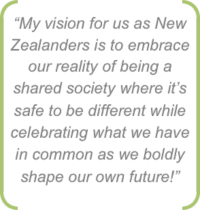

Jenny Shipley
Dame Jenny Shipley was prime minister of New Zealand from 1997 to 1999. During this time she achieved many ‘firsts’; not only was she our nation’s first female prime minister but in 1999 she also chaired the APEC meeting in New Zealand, the first woman to do so. Although she retired from politics in 2002 and returned to the private sector, she retained her intense interest in the development of leaders both in New Zealand and globally. She is now an independent director of a number of companies in New Zealand and offshore.
What three issues facing youth do you feel particularly strongly about?
Firstly, young people have so much opportunity, it almost overwhelms them to connect that to the reality of their lives and the skill sets they will require to exploit the opportunities ahead. They, their families, their communities, their schools and government need to think more carefully and astutely about how we can connect young people’s reality through pathways and mentoring to the connection points that will allow them to develop rapidly and become the leaders that they would wish to be.
Secondly, the challenge between reconciling their desire to be heard through their voice and their ability to make that voice heard through social media and representative democracy which has always been premised on one person, one vote. Increasingly young people see the traditional model of governance and representation as less relevant given that they can give voice to their views on any topic in any moment, through so many avenues of social media on a global basis. This is a challenge for all leaders of democracies, and also for global leadership which young people are challenging us to address.
Thirdly, I am dismayed by the waste of potential I see in young people who become inadvertently addicted to illegal substances. To me it is just a tragedy of waste of the potential they have. As a community we remain extremely dishonest about the consequences of these substances being available to young people and the impact on their lives by becoming users and in some instances addicted. The range of crime, the range of terrible dependence, even co-dependence among young women and users or pushers, for example, breaks my heart as I watch this human capital destroy itself. I long for the day when all of us, and in particular the media, disclose the reality of these lives and the crime that surrounds the use of these drugs, rather than shamefully ignoring the impact this use has.
In the case of legal drugs, particularly alcohol, I long for the time when adults will set an example around their children so that children will find ways to consume alcohol in moderation, rather than drink to excess; and in peer to peer terms I long for the time when young New Zealanders will exhibit the great strength of character and attitude that successive generations of our people have shown in so many areas of our lives. The status quo is not an option here. A new way forward has to be found.
Question 2: What changes would you like to make to the way New Zealand is governed?
The key change I would like to see in the way New Zealand is governed is not in fact the political or parliamentary structure, but rather the dynamic in terms of how we invite people to participate in our democracy. The speed with which people can form opinions today is a challenge to the rather pedestrian ways in which parliaments consult with their people. In my view new media now allows us to use much more dynamic structures, with perhaps a Situation Room where we could put a topic of legislation or a public issue up and invite multiple streams of New Zealanders to participate. We could segment the responses so that we had both a collective and then a segmented insight as to the different opinions and understandings that people had. Putting big data in this situation room and allowing New Zealanders to comment meaningfully through social networks would revolutionise the way consultation occurs and public–private partnerships evolve. In my view this would massively improve our parliamentary democracy, but also the quality of public policy that political parties, politicians and the public servants might continue to develop to represent and respond to the public interest.
Question 3: What actions, if any, are you planning to contribute to the constitutional review?
I do not have any particular plans to participate in the constitutional review. However, I continue to actively engage with people in many levels of government and hope that my views will be directly and indirectly reflected through that engagement.

